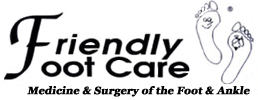Feet Need Vitamins Too
By Michael Nirenberg, DPM
Many of my older patients wish they had taken better care of their feet when they were younger. Thankfully, doctors and the health food industry are finally recognizing what many people have wanted for years: safe, natural ways to keep their feet strong and healthy.
The safest, simplest way to keep your feet healthy throughout life is already in your kitchen: water. Water regulates temperature and metabolism, delivers electrolytes to muscles and lubricates our joints. With each foot containing 33 joints and depending on 19 muscles, even slight dehydration can cause your feet to cramp and fatigue. I recommend drinking eight glasses of water a day. Guzzling Mountain Dew, Mocha Frappuccinos or six-packs of Bud Light isn’t the same. Caffeinated and alcoholic beverages can actually cause dehydration.
Drinking water, not only for your feet, but also for your whole body, should be common sense, yet at any time, 75 percent of Americans are mildly dehydrated. Moderate or severe lack of water can make feet cold and more vulnerable to infection. Dehydration can also make toenails brittle and the skin of our feet dry.
Dry skin may not seem like a big problem, but on the feet, dry skin can crack and develop deep, painful fissures that are at risk for infection. I’ve seen simple breaks in the skin, particularly in the feet of the elderly and people with diabetes, lead to catastrophic infections, at times resulting in the foot’s amputation.
However, dry skin on the feet may indicate more than just a lack of moisture. Sometimes it’s psoriasis, a fungal infection or a sign of a more serious condition, such as diabetes, poor circulation or a thyroid disorder. If your feet have severe or persisting dry skin, you should see a podiatrist.
The best way to soothe dry skin is with moisturizers and applying vitamin A, D and E. You can put these on your feet separately, mix a concoction or buy a vitamin-enriched cream. When choosing a cream, don’t go by price; more expensive doesn’t mean better. Read the ingredients and avoid products containing alcohol or alcohol derivatives, which actually dry skin. Surprisingly, alcohol is common in many so-called moisturizers.
Dry, irritated skin also responds to foot powder, particularly when the powder is enriched with zinc or menthol. A sprinkle a day will not only help keep the skin moisturized, but also lessen odor and perspiration.
Urea also helps keep feet healthy. A natural compound, urea attracts moisture, slowing its escape from the skin. Look for it by itself or in moisturizers. For patients with severely cracked heels, I often prescribe medicated creams containing 40 percent urea.
I also recommend urea for frail, brittle toenails. To strengthen toenails, apply Biotin, a B vitamin, and take calcium and vitamin A. Vitamin C helps nails too-not that they have to fight off colds, but they can get painful hangnails, which this vitamin prevents.
Caring for your feet as you age also means keeping your bones strong. Bones form the foot’s foundation, in turn supporting our entire body. With aging, bones lose strength and develop osteoporosis. Combine osteoporosis in your feet-each foot a jigsaw puzzle of 28 small bones-with a one hundred and fifty or two hundred pound person landing on them repeatedly and you have a great chance for fractures.
Women past menopause are at the greatest risk for osteoporosis. A simple test can check for osteoporosis and, if necessary, your doctor will prescribe medication. To help prevent osteoporosis, eat foods rich in calcium and vitamin D and exercise regularly, doing activities that put weight on your feet such as walking, aerobics or weight lifting.





